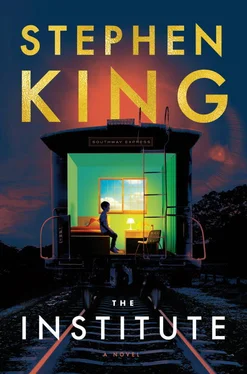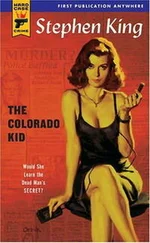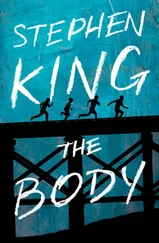“I didn’t think you could afford another cop’s salary. Did you all at once get a payroll increase?”
“Don’t I wish. But Bill Wicklow’s turning in his badge at the end of the year. I was thinking maybe you and him could swap jobs. He walks and knocks, you put on a uniform and get to carry a gun again. I asked Bill. He says night knocking would suit him, at least for a while.”
“Can I think about it?”
“I don’t know why not.” Sheriff John stood up. “End of the year’s still five months away. But we’d be glad to have you.”
“Does that include Deputy Gullickson?”
Sheriff John grinned. “Wendy’s hard to win over, but you got a long way down that road last night.”
“Really? And if I asked her out to dinner, what do you think she’d say?”
“I think she’d say yes, as long as it wasn’t Bev’s you were thinking of taking her to. Good-looking girl like her is going to expect the Roundup in Dunning, at the very least. Maybe that Mexican joint down in Hardeeville.”
“Thanks for the tip.”
“Not a problem. You think about that job.”
“I will.”
He did. And was still thinking of it when all hell broke loose on a hot night later that summer.
On a fine Minneapolis morning in April of that year—Tim Jamieson still months from his arrival in DuPray—Herbert and Eileen Ellis were being ushered into the office of Jim Greer, one of three guidance counselors at the Broderick School for Exceptional Children.
“Luke’s not in trouble, is he?” Eileen asked when they were seated. “If he is, he hasn’t said anything.”
“Not at all,” Greer said. He was in his thirties, with thinning brown hair and a studious face. He was wearing a sport shirt open at the collar and pressed jeans. “Look, you know how things work here, right? How things have to work, given the mental capacity of our students. They are graded but not in grades. They can’t be. We have ten-year-olds with mild autism who are doing high school math but still reading at a third-grade level. We have kids who are fluent in as many as four languages but have trouble multiplying fractions. We teach them in all subjects, and we board ninety per cent of them—we have to, they come from all parts of the United States and a dozen or so from abroad—but we center our attention on their special talents, whatever those happen to be. That makes the traditional system, where kids advance from kindergarten to twelfth grade, pretty useless to us.”
“We understand that,” Herb said, “and we know Luke’s a smart kid. That’s why he’s here.” What he didn’t add (certainly Greer knew it) was that they never could have afforded the school’s astronomical fees. Herb was the foreman in a plant that made boxes; Eileen was a grammar school teacher. Luke was one of the Brod’s few day students, and one of the school’s very few scholarship students.
“Smart? Not exactly.”
Greer looked down at an open folder on his otherwise pristine desk, and Eileen had a sudden premonition: either they were going to be asked to withdraw their son, or his scholarship was going to be canceled—which would make withdrawal a necessity. Yearly tuition fees at the Brod were forty thousand dollars a year, give or take, roughly the same as Harvard. Greer was going to tell them it had all been a mistake, that Luke wasn’t as bright as they had all believed. He was just an ordinary kid who read far above his level and seemed to remember it all. Eileen knew from her own reading that eidetic memory was not exactly uncommon in young children; somewhere between ten and fifteen per cent of all normal kids possessed the ability to remember almost everything. The catch was that the talent usually disappeared when children became adolescents, and Luke was nearing that point.
Greer smiled. “Let me give it to you straight. We pride ourselves on teaching exceptional children, but we’ve never had a student at the Broderick quite like Luke. One of our emeritus teachers—Mr. Flint, now in his eighties—took it on himself to give Luke a tutorial on the history of the Balkans, a complicated subject, but one that casts great light on the current geopolitical situation. So Flint says, anyway. After the first week, he came to me and said that his experience with your son must have been like the experience of the Jewish elders, when Jesus not only taught them but rebuked them, saying it wasn’t what went into their mouths that made them unclean, but what came out of them.”
“I’m lost,” Herb said.
“So was Billy Flint. That’s my point.”
Greer leaned forward.
“Understand me now. Luke absorbed two semesters’ worth of extremely difficult postgraduate work in a single week, and drew many of the conclusions Flint had intended to make once the proper historical groundwork had been laid. On some of those conclusions Luke argued, and very convincingly, that they were ‘received wisdom rather than original thought.’ Although, Flint added, he did so very politely. Almost apologetically.”
“I’m not sure how to respond to that,” Herb said. “Luke doesn’t talk much about his school work, because he says we wouldn’t understand.”
“Which is pretty much true,” Eileen said. “I might have known something about the binomial theorem once, but that was a long time ago.”
Herb said, “When Luke comes home, he’s like any other kid. Once his homework’s done, and his chores, he boots up the Xbox or shoots hoops in the driveway with his friend Rolf. He still watches SpongeBob SquarePants .” He considered, then added, “Although usually with a book in his lap.”
Yes, Eileen thought. Just lately, Principles of Sociology . Before that, William James. Before that, the AA Big Book, and before that, the complete works of Cormac McCarthy. He read the way free-range cows graze, moving to wherever the grass is greenest. That was a thing her husband chose to ignore, because the strangeness of it frightened him. It frightened her as well, which was probably one reason why she knew nothing of Luke’s tutorial on Balkan history. He hadn’t told her because she hadn’t asked.
“We have prodigies here,” Greer said. “In fact, I’d rate well over fifty per cent of the Brod’s student body as prodigies. But they are limited. Luke is different, because Luke is global . It isn’t one thing; it’s everything. I don’t think he’ll ever play professional baseball or basketball—”
“If he takes after my side of the family, he’ll be too short for pro basketball.” Herb was smiling. “Unless he’s the next Spud Webb, that is.”
“Hush,” Eileen said.
“But he plays with enthusiasm,” Greer continued. “He enjoys it, doesn’t consider it wasted time. He’s no klutz on the athletic field. He gets along fine with his mates. He’s not introverted or emotionally dysfunctional in any way. Luke is your basic moderately cool American kid wearing rock band tees and his cap around backward. He might not be that cool in an ordinary school—the daily trudge might drive him crazy—but I think even there he’d be okay; he’d just pursue his studies on his own.” He added hastily: “Not that you’d want to road-test that.”
“No, we’re happy with him here,” Eileen said. “Very. And we know he’s a good kid. We love him like crazy.”
“And he loves you. I’ve had several conversations with Luke, and he makes that crystal clear. To find a child this brilliant is extremely rare. To find one who’s also well-adjusted and well-grounded—who sees the outward world as well as the one inside his own head—is even rarer.”
“If nothing’s wrong, why are we here?” Herb asked. “Not that I mind hearing you sing my kid’s praises, don’t get that idea. And by the way, I can still beat his ass at HORSE, although he’s got a decent hook shot.”
Читать дальше







